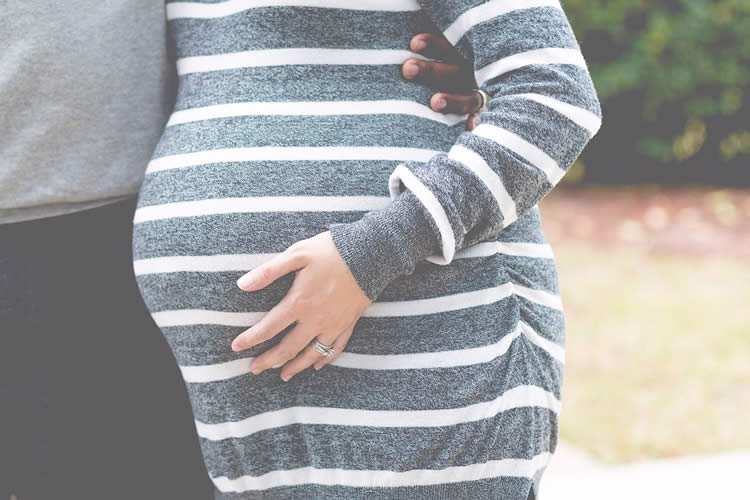Summary: Researchers find no association between an increased risk for autism in children and its mother contracting flu, or being exposed to the flu vaccine, during pregnancy.
Source: JAMA Network Journals.
A study of more than 196,000 children found no association between a mother having an influenza infection anytime during pregnancy and an increased risk of autism spectrum disorders (ASDs) in children, according to a new study published online by JAMA Pediatrics.
The study by Ousseny Zerbo, Ph.D., of Kaiser Permanente Northern California, Oakland, and coauthors included 196,929 children born in the health system from 2000 through 2010 at a gestational age of at least 24 weeks.
Within the group, there were 1,400 mothers (0.7 percent) diagnosed with influenza and 45,231 mothers (23 percent) who received an influenza vaccination during pregnancy. There were 3,101 children (1.6 percent) diagnosed with ASD.
The authors report no association between increased risk of ASD and influenza vaccination during the second and third trimesters of pregnancy. There was a suggestion of increased risk of ASD with maternal vaccination in the first trimester but the authors explain the finding was likely due to chance because it was not statistically significant after adjusting for multiple comparisons.

The study cannot establish causality and has several limitations, including ASD status determined by diagnoses on medical records and not validated by standardized clinical assessment for all cases. Also, the authors could not control for other possible unmeasured mitigating factors.
“We found no association between ASD risk and influenza infection during pregnancy or influenza vaccination during the second to third trimester of pregnancy. However, there was a suggestion of increased ASD risk among children whose mothers received influenza vaccinations early in pregnancy, although the association was insignificant after statistical correction for multiple comparisons. While we do not advocate changes in vaccine policy or practice, we believe that additional studies are warranted to further evaluate any potential associations between first-trimester maternal influenza vaccination and autism,” the study concludes.
Source: Vincent Staupe – JAMA Network Journals
Image Source: NeuroscienceNews.com image is in the public domain.
Original Research: Full open access research for “Association Between Influenza Infection and Vaccination During Pregnancy and Risk of Autism Spectrum Disorder” by Ousseny Zerbo, PhD; Yinge Qian, MS; Cathleen Yoshida, MA; Bruce H. Fireman, MA; Nicola P. Klein, MD, PhD; and Lisa A. Croen, PhD in JAMA Pediatrics Published online November 28 2016 doi:10.1001/jamapediatrics.2016.3609
[cbtabs][cbtab title=”MLA”]JAMA Network Journals “No Association Between Flu During Pregnancy and Increased Autism Risk in Children.” NeuroscienceNews. NeuroscienceNews, 30 November 2016.
<https://neurosciencenews.com/autism-flu-neurodevelopment-5636/>.[/cbtab][cbtab title=”APA”]JAMA Network Journals (2016, November 30). No Association Between Flu During Pregnancy and Increased Autism Risk in Children. NeuroscienceNew. Retrieved November 30, 2016 from https://neurosciencenews.com/autism-flu-neurodevelopment-5636/[/cbtab][cbtab title=”Chicago”]JAMA Network Journals “No Association Between Flu During Pregnancy and Increased Autism Risk in Children.” https://neurosciencenews.com/autism-flu-neurodevelopment-5636/ (accessed November 30, 2016).[/cbtab][/cbtabs]
Abstract
Association Between Influenza Infection and Vaccination During Pregnancy and Risk of Autism Spectrum Disorder
Importance Maternal infections and fever during pregnancy are associated with increased risk for autism spectrum disorders (ASDs). To our knowledge, no study has investigated the association between influenza vaccination during pregnancy and ASD.
Objective To investigate the association between influenza infection and vaccination during pregnancy and ASD risk.
Design, Setting, and Participants This cohort study included 196 929 children born at Kaiser Permanente Northern California from January 1, 2000 to December 31, 2010, at a gestational age of at least 24 weeks.
Exposures Data on maternal influenza infection and vaccination from conception date to delivery date, obtained from Kaiser Permanente Northern California inpatient and outpatient databases. Influenza infection was defined by the International Classification of Diseases, Ninth Revision, Clinical Modification codes or positive influenza laboratory test results.
Main Outcomes and Measures Clinical diagnoses of ASDs identified by International Classification of Diseases, Ninth Revision, Clinical Modification codes 299.0, 299.8, or 299.9 recorded in Kaiser Permanente Northern California electronic medical records on at least 2 occasions any time from birth through June 2015.
Results Within this cohort of 196 929 children, influenza was diagnosed in 1400 (0.7%) mothers and 45 231 (23%) received an influenza vaccination during pregnancy. The mean (SD) ages of vaccinated and unvaccinated women were 31.6 (5.2) and 30.4 (5.6) years, respectively. A total number of 3101 (1.6%) children were diagnosed with ASD. After adjusting for covariates, we found that maternal influenza infection (adjusted hazard ratio, 1.04; 95% CI, 0.68-1.58) or influenza vaccination (adjusted hazard ratio, 1.10; 95% CI, 1.00-1.21) anytime during pregnancy was not associated with increased ASD risk. In trimester-specific analyses, first-trimester influenza vaccination was the only period associated with increased ASD risk (adjusted hazard ratio, 1.20; 95% CI, 1.04-1.39). However, this association could be due to chance (P = 0.1) if Bonferroni corrected for the multiplicity of hypotheses tested (n = 8). Maternal influenza vaccination in the second or third trimester was not associated with increased ASD risk.
Conclusions and Relevance There was no association between maternal influenza infection anytime during pregnancy and increased ASD risk. There was a suggestion of increased ASD risk among children whose mothers received an influenza vaccination in their first trimester, but the association was not statistically significant after adjusting for multiple comparisons, indicating that the finding could be due to chance. These findings do not call for changes in vaccine policy or practice, but do suggest the need for additional studies on maternal influenza vaccination and autism.
“Association Between Influenza Infection and Vaccination During Pregnancy and Risk of Autism Spectrum Disorder” by Ousseny Zerbo, PhD; Yinge Qian, MS; Cathleen Yoshida, MA; Bruce H. Fireman, MA; Nicola P. Klein, MD, PhD; and Lisa A. Croen, PhD in JAMA Pediatrics Published online November 28 2016 doi:10.1001/jamapediatrics.2016.3609






